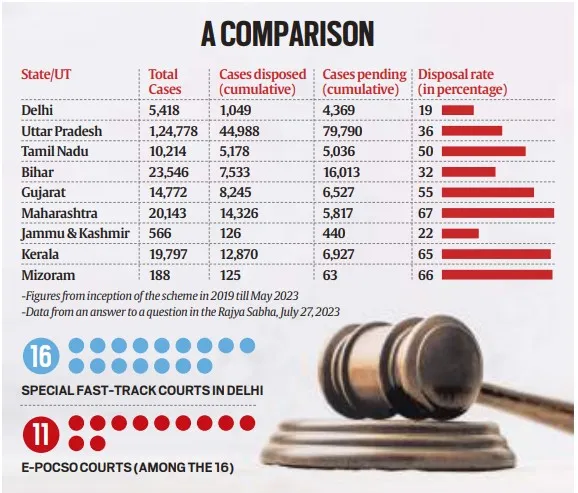Governance
Fast Track Special Courts
- 01 Dec 2023
- 7 min read
For Prelims: Fast Track Special Courts, Protection of Children from Sexual Offences Act (POCSO Act), Sexual Offenses, Criminal Law (Amendment) Act in 2018.
For Mains: Fast Track Special Courts, Welfare schemes for vulnerable sections of the population by the Centre and States and the performance of these schemes.
Why in News?
Recently, the Union Cabinet has approved the continuation of Fast Track Special Court (FTSCs) for three more years till 2026.
- Initially commenced in October 2019 for one year, the scheme was extended for an additional two years until March 2023.
What is a Fast Track Special Court (FTSCs)?
- About:
- FTSCs are specialized courts established in India with the primary aim of expediting the trial process for cases related to sexual offenses, particularly those involving rape and violations under the Protection of Children from Sexual Offences Act (POCSO Act).
- The establishment of FTSCs was prompted by the government's recognition of the alarming frequency of Sexual Offenses and the prolonged duration of trials in regular courts, which resulted in delayed justice for victims.
- Establishment:
- The Central Government enacted the Criminal Law (Amendment) Act in 2018, which introduced stricter punishments, including the death penalty for rape offenders.
- Subsequently, the FTSCs were set up to ensure the swift dispensation of justice for such cases.
- Centrally Sponsored Scheme:
- The scheme to establish FTSCs was formulated in August 2019 as a Centrally Sponsored Scheme following directions from the Supreme Court of India in a suo moto Writ Petition (Criminal).
- Ministry:
- Implemented by the Department of Justice, Ministry of Law & Justice.
- Achievements So far:
- Thirty States/Union Territories have participated in the Scheme, operationalizing 761 FTSCs, including 414 exclusive POCSO Courts, which have resolved over 1,95,000 cases.
- These courts support State/UT Government efforts to provide timely justice to victims of sexual offenses. even in remote and far-flung areas.
What are the Challenges Related to Fast Track Special Court?
- Inadequate Infrastructure and Low Disposal Rate:
- Special courts in India often suffer from the same challenges as regular courts, as they are usually designated rather than established as new infrastructure.
- This leads to overburdened judges who are assigned other categories of cases in addition to their existing workload without the necessary support staff or infrastructure.
- Consequently, the disposal rate of cases in these special courts slows down.
- The envisioned target of clearing around 165 POCSO cases per year per court has significantly fallen short, with each of the over 1,000 FTSCs in the country currently clearing only 28 cases on average annually.
- Prolonged Pendency:
- Over 2.43 lakh POCSO cases pending trial in FTSCs as of 31st January 2023.
- Projections indicate several decades are required to clear backlogs in states like Arunachal Pradesh, Delhi, Bihar, West Bengal, Uttar Pradesh, and Meghalaya.
- Estimated trial durations vary significantly across states, with projections ranging from 21 to 30 years.
- Conviction Rate Challenges:
- Despite the intended completion of trials within one year, the research reveals a low conviction rate.
- Out of 2,68,038 cases under trial, only 8,909 resulted in convictions, raising concerns about the efficacy of FTSCs.
- Despite the intended completion of trials within one year, the research reveals a low conviction rate.
- Limited Jurisdiction:
- These courts are established with a specific jurisdiction, which can limit their ability to deal with related cases. This can lead to delays in justice delivery and a lack of consistency in the application of laws.
- Ideally, cases in these special courts should be disposed of within a year. However, as of May 2023, Delhi had only disposed of 1,049 cases out of a total of 4,369 pending cases. This indicates a significant lag in meeting the target.
- These courts are established with a specific jurisdiction, which can limit their ability to deal with related cases. This can lead to delays in justice delivery and a lack of consistency in the application of laws.
- Vacancies and Lack of Training:
- The lack of judges due to vacancies affects the courts' capacity to handle cases effectively.
- As of 2022, lower courts across India had a vacancy rate of 23%.
- Regular judges from normal courts are often deputed to work in FTSCs.
- However, these courts require judges with specialized training to handle cases quickly and effectively.
- The lack of judges due to vacancies affects the courts' capacity to handle cases effectively.
- Prioritization of Certain Offences Over Others:
- The establishment of special courts in India is often determined by ad-hoc decisions made by both the judicial and executive branches of government.
- This approach means that certain categories of offences are arbitrarily prioritised for faster disposal over others.
What are the Initiatives to Curb Women and Child Abuse?
Way Forward
- Adequate infrastructure, including courtrooms, support staff, and modern technology, should be provided to FTSCs to ensure smooth and efficient operations.
- Additional funding should be allocated for the establishment and maintenance of these specialized courts.
- To enhance the disposal rate, FTSCs should focus on strict case management, reducing unnecessary delays caused by adjournments, and ensuring the timely presentation of evidence.
- Specialized training for judges and support staff can help streamline procedures and enhance the speed of proceedings.
- Efforts should be made to fill vacancies promptly and ensure that judges with relevant expertise are assigned to these courts.
UPSC Civil Services Examination, Previous Year Question (PYQ)
Mains
Q.1 We are witnessing increasing instances of sexual violence against women in the country. Despite existing legal provisions against it, the number of such incidences is on the rise. Suggest Some innovative measures to tackle this menace. (2014)







